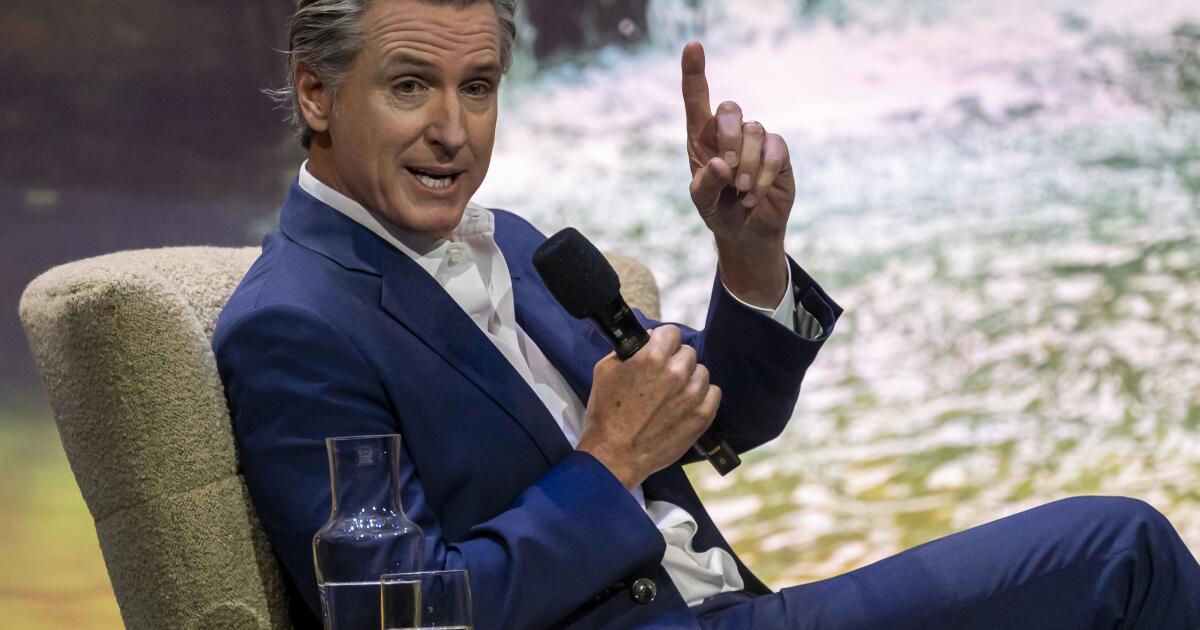SACRAMENTO — California Gov. Gavin Newsom on Sunday announced a new digital democracy initiative that will attempt to connect residents directly with government officials in times of disaster and allow them to express their concerns about matters affecting their day-to-day lives.
The web-based initiative, called Engaged California, will go live with a focus on aiding victims of the deadly wildfires in Pacific Palisades and Altadena who are struggling to recover. For example, comments shared via the online forum could potentially prompt government action regarding insurance coverage, building standards or efforts to require utilities to bury power lines underground.
In a written statement, Newsom described the pilot program as “a town hall for the modern era — where Californians share their perspectives, concerns, and ideas geared toward finding real solutions.”
“We’re starting this effort by more directly involving Californians in the LA firestorm response and recovery,” he added. “As we recover, reimagine, and rebuild Los Angeles, we will do it together.”
The Democrat’s administration has ambitious plans for the effort that go far beyond the wildfires. Engaged California is modeled after a program in Taiwan that became an essential bridge between the public and the government at the height of the COVID-19 pandemic. The Taiwanese government has relied on it to combat online political disinformation as well.
An email address is all Californians will need to sign into the state’s digital platform to share their ideas and to see the results of that collective action. It will use artificial intelligence to sift through comments and prioritize responses by state officials.
“My hope is that people will see in this an opportunity to give real-time, honest input to the state of California, to deliberate with each other about some hard and important issues like how to speed the recovery and make it effective, to do that in a way that is not going to be too burdensome or difficult for them,” said Amy Tong, secretary of the California Government Operations Agency.
The digital initiative is a public-private partnership that includes nearly a dozen academic and nonprofit organizations. The software platform and other digital tools for the effort cost the state approximately $120,000, said Roy Kennedy, a spokesperson for the agency.
On the website, Californians will be able to see an aggregation of public comments that are stripped of personal information that might identify the residents who participate, Tong said. The results will then by analyzed by agency staff members, who will recommend government responses.
Engaged California is designed to be more accessible for residents than traditional avenues for influencing government, such as testifying before city councils, writing letters or emailing legislators, said Mariano-Florentino Cuéllar, president of the Carnegie Endowment for International Peace, one of the program’s partners.
The platform should produce “an authentic set of insights that are partly about bridging divides between people who are out there in the community who participate, but also about uncovering ideas and insights that the government might not always be able to get,” said Cuéllar, a former justice of the California Supreme Court. “The goal is not just to post things that people submit. It’s to foster a conversation.”
This isn’t Newsom’s first foray into technology. As a supervisor and then mayor of San Francisco, Newsom lived through the tech boom of the 1990s and early 2000s and established strong political ties to industry leaders in Silicon Valley and beyond. His 2013 book, “Citizenville: How to Take the Town Square Digital and Reinvent Government,” surveyed tech titans about how data could be better used to make government decisions.
As governor, Newsom has had the difficult task of trying to preserve California’s position as the vanguard of technology while shielding children and the rest of society from the harms of social media, artificial intelligence and online disinformation.
While attending an AI conference in San Francisco last year, Newsom described his philosophy on the interplay between government and technoloy firms during a talk with Salesforce Chief Executive Marc Benioff, the godfather of the governor’s oldest child.
“I want to maintain our dominance. I want to maintain our innovation,” Newsom said. “At the same time, you feel a deep sense of responsibility to address some of those more extreme concerns that I think many of us have — even the biggest and strongest promoters of this technology have — and that’s a difficult place to land.”
